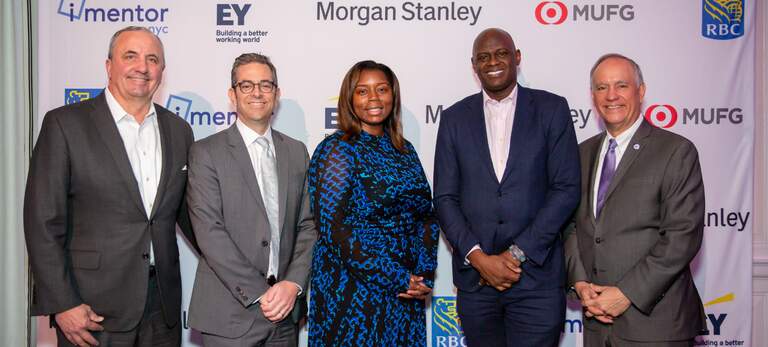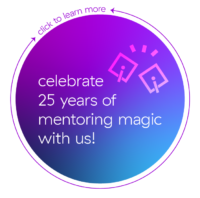The event featured a panel of industry leaders and raised over $255,000 towards iMentor’s mission to support first-generation college students through college and careers.
This February, iMentor welcomed nearly 200 guests from NYC’s top corporations and foundations to its Breakfast of Champions fundraising event to celebrate the power of partnership and mentoring relationships. For the past 25 years, iMentor has fostered mentorships that have opened doors to colleges and career pathways for more than 42,000 students nationwide.
As a premier mentoring organization and the largest of its kind to partner with NYC’s public schools, iMentor is now expanding our career-connected mentorship through new partnerships with the City University of New York (CUNY) focused on high-growth, in-demand, and lucrative sectors such as financial services, healthcare, and technology. Career-connected mentorship provides opportunities for iMentor students to gain career exposure and expand their networks so that they can pursue jobs post-college that are sustainable and support their economic mobility.
The Breakfast of Champions featured a panel facilitated by Natasha Holiday, Co-Head & Managing Director, Infrastructure East at RBC Capital Markets and iMentor NYC Advisory Board Member with speakers Carmine Di Sibio, Global Chairman and CEO at EY; Félix V. Matos Rodríguez, Chancellor of CUNY; and Peter Akwaboah, Managing Director and COO of Technology & Global Head of Innovation at Morgan Stanley. The panelists discussed the role that mentorship plays in higher education and the corporate world to develop the diverse talent of tomorrow.
Mentorship for Economic Mobility
While talent is equally distributed across society, access to mentorship is not. First-generation college students often navigate the high school-to-college pipeline with limited access to mentorship, professional networks, and industry knowledge – limiting their ability to achieve economic mobility.
Other external factors can often impact a student’s ability to reach their potential. This is where a mentor comes in, says Matos Rodríguez. “Our students are smart, talented and highly motivated but a lot of things can get in the way -- many have to work, they have family obligations – and most don’t have the personal relationships and professional connections they need to get a jump on their careers,” he explains. “There is nothing so potentially life-changing as a relationship with a mentor – someone who can guide them and support them; someone who has been where they are and can show them the way forward and has their back.”
Mentorship as Connection
In addition to the guidance and advice that a mentor provides, mentoring relationships foster a human connection that is just as powerful. “We can use mentorship as a way to break barriers, to connect with people that come from different backgrounds and cultures, to facilitate conversations that might not be organically easy in some settings,” Matos Rodríguez says.
Akwaboah agrees that the reciprocal nature of mentorship adds value to his life both as a mentor and mentee. “I look for a coach, a sponsor, a mentor, and a friend,” he says. “It becomes a reverse mentorship. The people that I mentor, one day I’ll be working for them.”
Mentorship for Talent Development
Mentorship is not only for high schoolers transitioning into college, nor does it end at a certain age or status. As Di Sibio notes, integrating mentorship into the workplace is a smart move for businesses to ensure they have access to the best and most diverse talent. “It’s a business issue and I think it’s really important that people view it that way,” he says. “You have to make sure you’re gaining the best talent in all different skillsets with different backgrounds. That’s what makes what we do more powerful.”
He continues to explain that EY is structured around this mentorship philosophy and that it is a measure of their strength as a team. “Our entire organization is built on mentorship. We look at how people mentor and nurture talent in order to evaluate their leadership potential,” Di Sibio says.
As the leading engine of social and economic mobility, CUNY collaborates with EY and iMentor to bring mentorship structures to scale. EY along with the New York City Jobs Council creates apprenticeships that enable people to simultaneously enroll in CUNY programs. With almost 70% of iMentor students matriculating into a CUNY school, the two organizations will continue to develop more formal career-connection partnerships that would provide students with mentoring from high school all the way through college.
Your investment in iMentor is an investment in the scale, impact, and results that our mentors and mentees can achieve together. Donate today: https://give.imentor.org/give/537402/#!/donation/checkout

